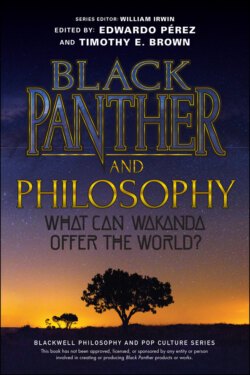Читать книгу Black Panther and Philosophy - Группа авторов - Страница 36
Knowledge Is Power: What Would You Do With It?
ОглавлениеRAMONDA: Son, we have entertained this charlatan for too long. Reject his request.
Why does Ramonda label Killmonger a charlatan? Is it because she’s afraid of his words or is it because Killmonger is a stranger to her? Even when she learns of his true heritage, she doesn’t really respect him. Why? Perhaps it’s because of the knowledge Killmonger possesses.
In wanting to deny Killmonger, Ramonda is guilty of an epistemic injustice, which, as Miranda Fricker observes (in a field-defining characterization), is the occurrence of harm to one’s status as a knowledge-bearer.1 One classic category and example Fricker presents is testimonial injustice, where one’s view is considered less credible because of one’s status – this is what Ramonda does to Killmonger; he is not credible because of his status as an outsider. Seeing this type of injustice directed toward Killmonger allows us to also see the broader epistemicide (the killing of knowledge) that many African peoples experienced throughout the world, especially from missionaries and colonial governments that enforced new, Western ways of being and standards for what counts as credible knowledge. This is a key feature of colonizers who, by imposing a new knowledge paradigm, destroy the old one – or, like Ramonda, when those in power who control knowledge don’t want that knowledge challenged. That’s why Killmonger is a charlatan called Killmonger and not a son of Wakanda called N’Jadaka.
As Dennis Masaka argues, “the tendency to deny other geopolitical centres the capacity to contribute to human civilisation has been the defining character of Eurocentrism.”2 This is, in part, why the narrative of Wakanda possessing valuable, civilization-creating knowledge resonates so deeply for many. Most African communities did not get a chance to develop and grow their ways of being into the modern era, and are even now faced with a racist view that in a counterfactual world with no colonialism, they would not have reached anything worthy of being termed “civilization.” Wakanda is a powerful counter-narrative to this view.
So, understanding the underlying injustice of epistemicide can help us understand the extent of this power; I do not wish to undermine this great achievement of Black Panther – I am not challenging the fact that Wakanda is portrayed as a possessor of powerful, world-changing knowledge. Rather, in this chapter, I want to question the content of the attitudes and way of life that the creators imagined this reality would create. Wakanda provides a powerful opportunity to imagine a scenario counterfactual to colonialism; have we done enough with this opportunity?
